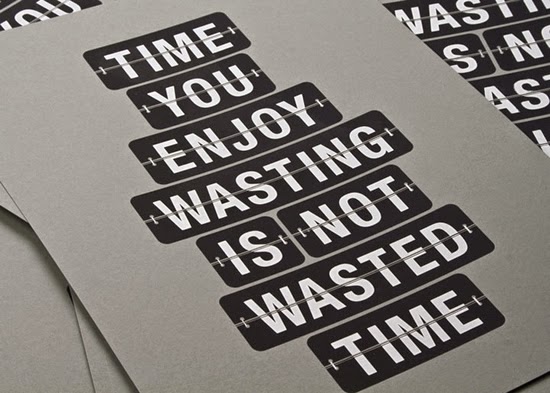It is not that we have so little time but that we lose so much. The life we receive is not short but we make it so; we are not ill provided but use what we have wastefully.
--Lucius Seneca, On the Shortness of Life
What is the most valuable commodity in the world?
Is it Gold?
Water?
Rice?
Coffee?
The correct answer is, None of the above.
The most valuable commodity in the world is time and ironically it's the one we hold in lowest esteem. Think about all the time you've wasted over the years, all the idle hours spent watching TV, playing video games, sleeping in, and being bored.
All those hours are gone forever.
If the value of a commodity is based on supply and demand, how can anything be worth more than time?
Time is always in short supply because it's the ultimate non-renewable resource. Each one of us is born with a finite amount and life starts debiting your account the moment you're pulled from the womb. When your funds eventually run out you can't ask for an extension or borrow more time from the bank.
Things are just as bleak on the demand side of things. Nothing can be obtained, acquired, or accomplished without investing time into it, which is why everyone needs it. You've got 24 hours a day in your budget and eight of them are for sleeping. That leaves 16 hours to spend on your interests, hobbies, education, family, friends, and peers.
How often do you hear people say, "I don't have time to do this" or "if only I had more time!" How often do you think or say these things yourself? Everyone is short on time. Everyone could use more. The only difference is that some people know it while others do not.
If you understand the preciousness of time you probably try to invest it carefully. But this begs the question: how does one go about distinguishing between worthwhile investments and worthless ones?
You need wisdom for that.
What do I mean by wisdom? Simply this: the ability to think and act using knowledge, experience, understanding, common sense, and insight, with good intentions.
Where does one acquire wisdom, exactly? It's not like there's a Wisdom 101 class being offered at your local community college. Because wisdom is actually the culmination of different skills, traits, and behaviours, it has to be assembled piece by piece. You can acquire knowledge in school or in books, experience in everyday life, understanding through study, common sense with practice, and insight through contemplation, but wisdom requires you to use them all in concert.
If only there was a one-stop shop where you could acquire the building blocks and learn to put them together... Oh wait, there is!
It's called Philosophy, which in Greek literally means "Love of Wisdom."
Forget what you think you know about philosophy. Modern academics have transformed this ancient discipline into something radically different from its original state. You need only read what ancient philosophers wrote about philosophy's purpose and function for proof. According to Seneca, for example, philosophy
is a matter not of words, but of facts. It is not pursued in order that the day may yield some amusement before it is spent, or that our leisure may be relieved of a tedium that irks us. It moulds and constructs the soul; it orders our life, guides our conduct, shows us what we should do and what we should leave undone; it sits at the helm and directs our course as we waver amid uncertainties.You can be sure that the acquisition of wisdom, whether through philosophy or other means, is time well-spent. Wisdom dispels illusion and reveals the true worth of every object, person, pursuit, and action. It acts like a map that reveals the location of various treasures and outlines potential routes to reach them.
Wisdom reveals the hedonic treadmill beneath your feet and the endless line of carrots dangling into the distance. It gives you the ability to distinguish between worthwhile investments and worthless ones, meaning you won't waste another second of your time ever again if you don't want to.
And that's good news, considering how strapped everyone is for time.
Material pursuits are necessary. We all need to make money in order to pay the rent, stock the fridge, and obtain other bare necessities. Some luxuries are also worth pursuing, but only so long as we remember their nature and function. Luxuries are means, not ends: they make life easier, more convenient, or more enjoyable. In other words, they can contribute to the ultimate end, which I believe is the same for all people and yet so damn elusive: happiness.
A wise person enjoys material goods while they are in her possession but doesn't count on these for personal happiness. Happiness derived from externals is temporary and fleeting; it will turn to misery at Fortune's whim. A wise person spends very little time chasing temporary pleasures, choosing instead to invest time on those things that cannot be lost, stolen, or destroyed.
This life of yours is a precious and temporary gift. The sand in your hourglass is constantly slipping away grain by grain and when it runs out, that's your cue to exit stage left. It is in your power to infuse your life with purpose and meaning here and now, while you can. You have the ability to rearrange your priorities and invest every moment of your time into worthwhile pursuits.
Only a fool would choose to waste the most precious commodity in the world. Let wisdom be your map and reason your compass. With these you will never be tricked into throwing your time away.
/rant over



No comments:
Post a Comment